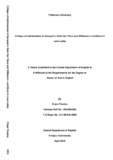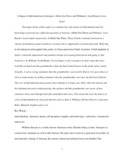Please use this identifier to cite or link to this item:
https://elibrary.tucl.edu.np/handle/123456789/3036| Title: | Critique of Individualism in Saroyan’s Hello Out There and Williams’s Lord Byron’s Love Letter |
| Authors: | Timsina, Pujan |
| Keywords: | Individualism;American drama;Self-deception |
| Issue Date: | 2019 |
| Publisher: | Central Departmental of English |
| Abstract: | The major thrust of this study is to examine how the notion of individualism and the knowledge of growth are called into question in Saroyan’s Hello Out There and Williams’ Lord Byron’s Love Letter respectively. In Hello Out There, Photo Finish is already involved in a charge of mounting sexual assault on a woman who is supposedly a promiscuous lady. Believing in the charge leveled against him, police in Texas imprisons Finish. In prison, Finish implants in Emily’s mind the impractical and pointless dream of escaping from prison and going to San Francisco. In Williams’ Lord Byron’s Love Letter, it tells customers in their salon that once Lord Byron had loved the grandmother when she had visited Greece in the prime of her youth. Actually, it was a wrong statement that the grandmother was loved by Byron. It is just a hoax or trick to make money by telling customers that the grandmother was once the beloved of Byron. The sort of individualism and progress they embody is a bogus one. Only when the matron and her husband run away without paving, the spinster and the grandmother are aware of how customers have seen through their fake and fabricated story. The researcher uses the theory of critic of individualism by using the theorist such as Alan S. Williams, Herbert Hoover, Lawrence Bobo, Mennell. Stephen and so on. Key Words: Individualism, American drama, self-deception, fragility and irrelevance, subversive, commercial endeavors |
| URI: | http://elibrary.tucl.edu.np/handle/123456789/3036 |
| Appears in Collections: | English |
Files in This Item:
| File | Description | Size | Format | |
|---|---|---|---|---|
| Cover.pdf | 17.84 kB | Adobe PDF |  View/Open | |
| Chapter.pdf | 126.37 kB | Adobe PDF |  View/Open |
Items in DSpace are protected by copyright, with all rights reserved, unless otherwise indicated.
